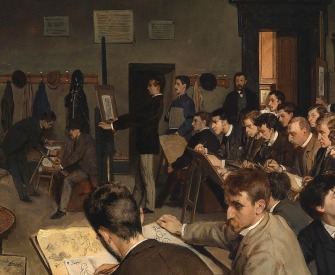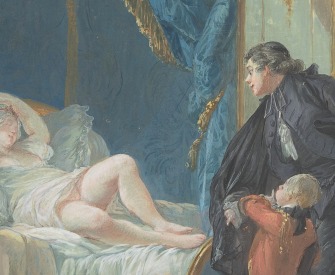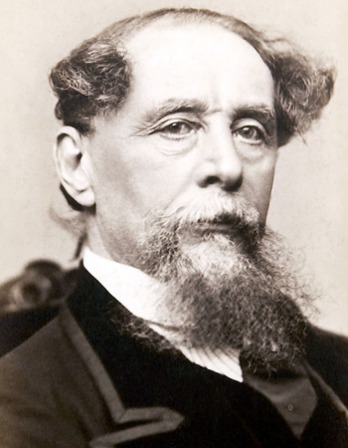A spacious hive well-stocked with bees,
That lived in luxury and ease;
And yet as famed for laws and arms,
As yielding large and early swarms;
Was counted the great nursery
Of sciences and industry.
Vast numbers thronged the fruitful hive;
Yet those vast numbers made ’em thrive;
Millions endeavoring to supply
Each other’s lust and vanity;
Whilst other millions were employed,
To see their handiworks destroyed;
They furnished half the universe;
Yet had more work than laborers.
Some with vast stocks, and little pains
Jumped into business of great gains;
And some were damned to scythes and spades,
And all those hard laborious trades;
Where willing wretches daily sweat,
And wear out strength and limbs to eat:
Whilst others followed mysteries,
To which few folks bind ’prentices;
That want no stock, but that of brass,
And may set up without a cross;
As sharpers, parasites, pimps, players,
Pickpockets, coiners, quacks, soothsayers,
And all those that in enmity
With downright working, cunningly
Convert to their own use the labor
Of their good-natured heedless neighbor.
These were called knaves; but, bar the name,
The grave industrious were the same.
All trades and places knew some cheat,
No calling was without deceit.
The lawyers, of whose art the basis
Was raising feuds and splitting cases,
Opposed all registers, that cheats
Might make work with dipt estates;
As were’t unlawful, that one’s own,
Without a lawsuit, should be known.
They kept off hearings willfully,
To finger the refreshing fee;
And to defend a wicked cause,
Examined and surveyed the laws;
As burglars, shops, and houses do;
To find out where they’d best break through.
Among the priests of Jove,
Hired to draw blessings from above,
Some few were learned and eloquent,
But thousands hot and ignorant:
Yet all passed muster that could hide
Their sloth, lust, avarice, and pride;
For which they were as famed, as Taylors
For cabbage; or for brandy, sailors:
Some meager looked, and meanly clad
Would mystically pray for bread,
Meaning by that an ample store,
Yet literally received no more;
And, whilst these holy drudges starved,
The lazy ones, for which they served,
Indulged their ease, with all the graces
Of health and plenty in their faces.
For there was not a bee, but would
Get more, I won’t say, than he should;
But than he dared to let them know,
That paid for’t; as your gamesters do,
That, though at fair play, never will own
Before the losers what they’ve won.
From The Fable of the Bees: Private Vices, Publick Benefits. Born in Rotterdam in 1670, Mandeville published the first edition of his Fable in 1714, which included an “Enquiry into the Origin of Moral Virtue” and his own “Remarks” on the poem. Arguing that all actions are selfish but that public good comes from them, he drew criticism from clergymen and scholars alike, quickly becoming infamous.
Back to Issue





